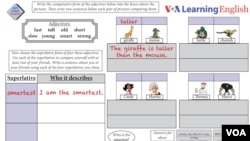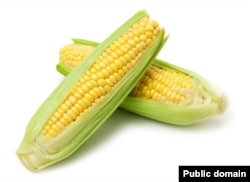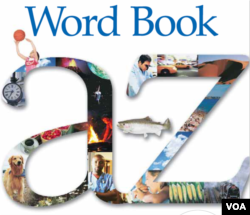Let's Learn English (Tiếng Anh cơ bản) là một khóa học tiếng Anh mới. Các giáo viên dạy tiếng Anh-Mỹ đã soạn thảo khóa học này cho những người mới bắt đầu. Khóa học sẽ kéo dài trong 52 tuần.
Mỗi tuần sẽ có một bài học mới bằng video cho thấy cuộc sống của giới trẻ Mỹ. Bài học giúp trau dồi kỹ năng nói, viết và từ vựng.
Ngoài ra cũng sẽ có các bài thực hành có thể in ra, bảng đánh giá và kế hoạch học tập cho cá nhân và giáo viên dạy tiếng Anh. Chúng tôi khuyến khích các bạn theo dõi các bài học hàng tuần và chia sẻ sự tiến bộ của bạn với chúng tôi qua phần ý kiến và email.
Tóm lược (Summary)
Anna plans to have a dinner party. She needs to buy seafood, so she goes to the waterfront. She gets a surprise at the fish market.
Anna dự định tổ chức một buổi tiệc tối. Cô ấy cần mua hải sản vì vậy mà cô ấy đã tới khu chợ bán cá. Nơi này đã khiến cô bất ngờ.
Nói (Speaking)
In this video, learn to say the new words for this lesson. You can also learn about how to use count and noncount nouns.
Cách phát âm (Pronunciation)
Use this video to learn about the abbreviations for dozen and pounds.
Phần đối thoại (Conversation)
Anna: Hello! Washington, D.C. sits on the
Potomac River. This river is important to the history and culture of the city. Today, I am at an outdoor
seafood market near the Potomac River. Some say it is the
oldest outdoor seafood market
in the United States! I am here to buy seafood. Let’s see what they have!
Anna: Excuse me. Can you help me?
Pete: Sure! What do you need?
Anna: Pete!
Pete: Anna!
Anna: What are you doing here?
Pete: I work here. You know, it’s not easy to be a writer.
Anna: Yeah, I heard that. Sorry.
Pete: But this job is great. I work outside by the river. And I can eat all the free seafood I want!
Anna: That is great, Pete. In fact, I am here to buy some seafood for my dinner party.
Pete: You came to the right place. They have the freshest seafood in town. How much money can you spend?
Anna: I can only spend $50.
Pete: Okay. What do you want?
Anna: First, I want to buy some shrimp.
Pete: Sure thing. Follow me. How much shrimp do you want?
Anna: How much do I need for five people?
Pete: (yells to co-worker) Give her a pound of shrimp!
Anna: Ok, now I want to buy some crabs.
Pete: The crabs here are delicious! They are the best because they come from the nearby Chesapeake Bay! Walk this way.
Pete: How many crabs do you want?
Anna: I want a dozen crabs.
Pete: You should get the larger crabs. They have the most meat.
Anna: Then I want a dozen large crabs, please!
Pete: Is that everything you need?
Anna: Let’s see … I have shrimp and crabs. And a friend is bringing a salad and many ears of corn-on-the-cob.
Pete: Is that all the seafood that you need?
Anna: Yes.
Pete: That’ll be $49.95. Cash or credit?
Anna: Credit, please.
Pete: Anna, you love to eat seafood. Did you grow up on the water?
Anna: No, I didn’t. But I love the water. And I love being on the water.
Pete: You know how to sail?
Anna: Well … this afternoon I am going on a boat.
Pete: You are full of surprises. What kind of boat? Is it a motorboat or a sailboat?
Anna: It’s a special boat, Pete. Well, thanks for your help. See you later!
Pete: See you, Anna! Wow, Anna’s a sailor! Who knew?
Anna: Yes, rivers are important to the history and culture of Washington, D.C. And now I am part of this city’s interesting waterfront culture. Until next time!
Viết (Writing)
Where do you buy fresh food? Is there a seafood or vegetable market near where you live? Tell us about it! Try to use some of the words from this lesson, like best, freshest, oldest, spend, money, and larger. Write to us by email or in the Comments section.
Click on the image below to download the Activity Sheet and practice using comparative and superlative adjectives with a friend.
Sách lược học tập (Learning Strategy)
Learning Strategies are the thoughts and actions that help make learning easier or more effective.
The learning strategy for this lesson is Make Inferences . Making inferences means using some information to make a guess. When learning a new language, we often need to guess at the meanings of words or sentences.
In this week's video, Pete guesses that Anna grew up on the water. He says, "Anna, you love to eat seafood. Did you grow on near the water?"
Anna answers, "No, I didn’t. But I love the water. And I love being on the water." Pete hears that and uses the information to make an inference about Anna. He asks her, "You know how to sail?"
Can you find another place in the conversation when Pete makes an inference? Do you ever make inferences when listening to or reading English? Write to us about it in the Comments section or send us an email. Teachers, see the Lesson Plan for more details on teaching this strategy.
Bài kiểm tra (Quiz)
Listen to short videos and test your listening skills with this quiz.
Quiz - Lesson 30
Start the Quiz to find out
______________________________________________________________
Từ ngữ mới (New Words)
best - adj. better than all others in quality or value
Chesapeake Bay- n. an inlet of the Atlantic, in Maryland and Virginia. It is 200 miles (or 320 km) long; and from 4–40 miles (or 6–64 km) wide.
corn-on-the-cob - n. corn when cooked and eaten straight from the cob - the part of corn that the kernels grow on; an ear of corn
.
crab - n. a sea animal that has a hard shell, eight legs, and two large claws
credit - n. money that a bank or business will allow a person to use and then pay back in the future
dozen - n. a group of 12 people or things
ear - n. the part of a corn plant on which the seeds grow
freshest - adj. the most fresh
many - adj. used to refer to a large number of things or people
much - adj. large in amount or extent
larger - adj. greater in size or amount
market - n. a place where products are bought and sold
money - n. something (such as coins or bills) used as a way to pay for goods and services and to pay people for their work
most - adj. almost all or the majority of
motorboat - n. a boat with a motor
oldest - adj. having the highest age of a group
Potomac River - proper noun. a river flowing from West Virginia to the Chesapeake Bay. It flows between Maryland and Virginia.
pound - n. a unit of weight that is equal to 16 ounces or about a half of a kilogram
river - n. a large natural flow of water that crosses an area of land and goes into an ocean or a lake
sail - v. to travel on water in a ship or boat
sail - n. large piece of strong cloth that is connected to a ship or boat and that is used to catch the wind that moves the ship or boat through the water
sailboat - n. a boat that has a sail
sailor - n. a person who works on a boat or ship as part of the crew
salad - n. a mixture of raw green vegetables, such as different types of lettuce, usually combined with other raw vegetables
seafood - n. fish and shellfish that live in the ocean and are used for food
some - adj. refers to an unspecified amount or number
spend - v. to use money to pay for something
water - n. an area of water such as a lake, river, or ocean
waterfront - n. the land or the part of a town next to the water of an ocean, river or lake.
______________________________________________________________
Tài liệu miễn phí (Free Materials)
Download the VOA Learning English Word Book for a dictionary of the words we use on this website.
Each Let's Learn English lesson has an Activity Sheet for extra practice on your own or in the classroom. In this lesson, you can use it to practice using comparative and superlative adjectives.
Phần dành cho giáo viên (For Teachers)
See the Lesson Plan for this lesson for ideas and more teaching resources. Send us an email if you have comments on this course or questions.
Grammar focus: Comparative and superlative adjectives; Quantitatives (much/many); Count/non-count nouns
Topics: Asking for and making food recommendations; Units of measure & their abbreviations; dollar amounts expressed in numerals; credit/debit payment
Learning Strategy: Make Inferences
Speaking & Pronunciation Focus: Using count and noncount nouns; Abbreviations for amounts
______________________________________________________________
Now it's your turn. Send us an email or write to us in the Comments section below or on our Facebook page to let us know what you think of this lesson.





